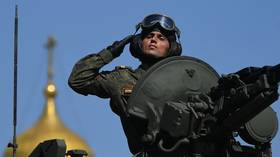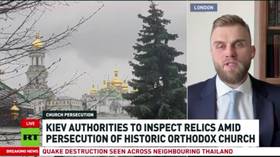‘In the spirit of goodwill’: Moscow won’t deploy controversial 9M729 missiles in European Russia if NATO reciprocates, says Putin

Russia will delay deployment of its much-debated 9M729 missiles in the European part of its territory, as a goodwill gesture, if NATO takes reciprocal steps. Monday's proposal comes after the US withdrew from the INF treaty.
“Given the unrelenting tension between Russia and NATO, new threats to European security are becoming evident,” Russian President Vladimir Putin, in a statement posted on the Kremlin's website.
Signed in 1987, the Intermediate-Range Nuclear Forces Treaty (INF) banned land-based missiles with a range of more than 500km. According to Putin, the agreement was vital for ensuring international security and strategic stability, and the US' withdrawal was a mistake which risks provoking a missile arms race.
In October 2018, American President Donald Trump announced that his country would withdraw from the treaty, blaming supposed Russian non-compliance. In particular, Trump accused the Kremlin of creating a missile that is effective over the legal limit of 500km, named 9M729. Steven Pifer, the former US ambassador to Ukraine, once estimated that its range is 2,000 kilometers. Pifer is now the director of the Arms Control Initiative at the Brookings' lobby group, which is funded by Gulf states, amongst other donors.
Also on rt.com What’s ‘verifiable’? Extension of US-Russia nuclear New START treaty hinges on wordAs part of his stated attempt to de-escalate, Putin also revealed that he wishes to take further steps to minimize the negative consequences of the collapse of the INF Treaty, including an agreement for mutual inspections of missile systems. The president also reiterated Russia's previous promise not to deploy ground-based INF missiles until US-made missiles of similar classes are deployed.
On the controversial 9M729 missiles, Putin maintained they are in “full compliance” with the previously existing INF treaty, but still offered not to position them in Europe.
“The Russian Federation, nevertheless, is ready, in the spirit of goodwill, to continue not to deploy 9M729 missiles in European Russia, but do so only provided NATO countries take reciprocal steps that preclude the deployment of the weapons earlier prohibited under the INF Treaty in Europe,” the statement read.
Also on rt.com Washington’s ‘no’ to Putin’s proposal of a New START extension is a political victory for MoscowThink your friends would be interested? Share this story!















